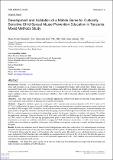Development and Validation of a Mobile Game for Culturally Sensitive Child Sexual Abuse Prevention Education in Tanzania: Mixed Methods Study

View/
Date
2021-05-13Author
Malamsha, Maria
Sauli, Elingarami
Luhanga, Edith
Metadata
Show full item recordAbstract
Background: Globally, 3 out of 20 children experience sexual abuse before the age of 18 years. Educating children about sexual abuse and prevention is an evidence-based strategy that is recommended for ending child sexual abuse. Digital games are increasingly being used to influence healthy behaviors in children and could be an efficient and friendly approach to educating children about sexual abuse prevention. However, little is known on the best way to develop a culturally sensitive game that targets children in Africa—where sexual education is still taboo—that would be engaging, effective, and acceptable to parents and caretakers.
Objective: This study aimed to develop a socioculturally appropriate, mobile-based game for educating young children (<5 years) and parents and caretakers in Tanzania on sexual abuse prevention.
Methods: HappyToto children’s game was co-designed with 111 parents and caretakers (females: n=58, 52.3%; male: n=53, 47.7%) of children below 18 years of age and 24 child experts in Tanzania through surveys and focus group discussions conducted from March 2020 to April 2020. From these, we derived an overview of topics, sociocultural practices, social environment, and game interface designs that should be considered when designing child sexual abuse prevention (CSAP) education interventions. We also conducted paper prototyping and storyboarding sessions for the game’s interface, storylines, and options. To validate the application’s prototype, 32 parents (females: n=18, 56%; males: n=14, 44%) of children aged 3-5 years and 5 children (females: n=2, 40%; males: n=3, 60%) of the same age group played the game for half an hour on average. The parents undertook a pre-post intervention assessment on confidence and ability to engage in CSAP education conversations, as well as exit surveys on the usability and sociocultural acceptability of the game, while children were quizzed on the topics covered and their enjoyment of the game.
Results: Parents and caregivers showed interest in the developed game during the conducted surveys, and each parent on average navigated through all the parts of the game. The confidence level of parents in talking about CSAP increased from an average of 3.56 (neutral) before using the game to 4.9 (confident) after using the game. The ability scores, calculated based on a range of topics included in CSAP education talks with children, also increased from 5.67 (out of 10) to 8.8 (out of 10) after the game was played. Both confidence level and ability scores were statistically significant (P<.001). All 5 children were interested in the game and enjoyed the game-provided activities.
Conclusions: The HappyToto game can thus be an effective technology-based intervention for improving the knowledge and skills of parents and children in CSAP education.
